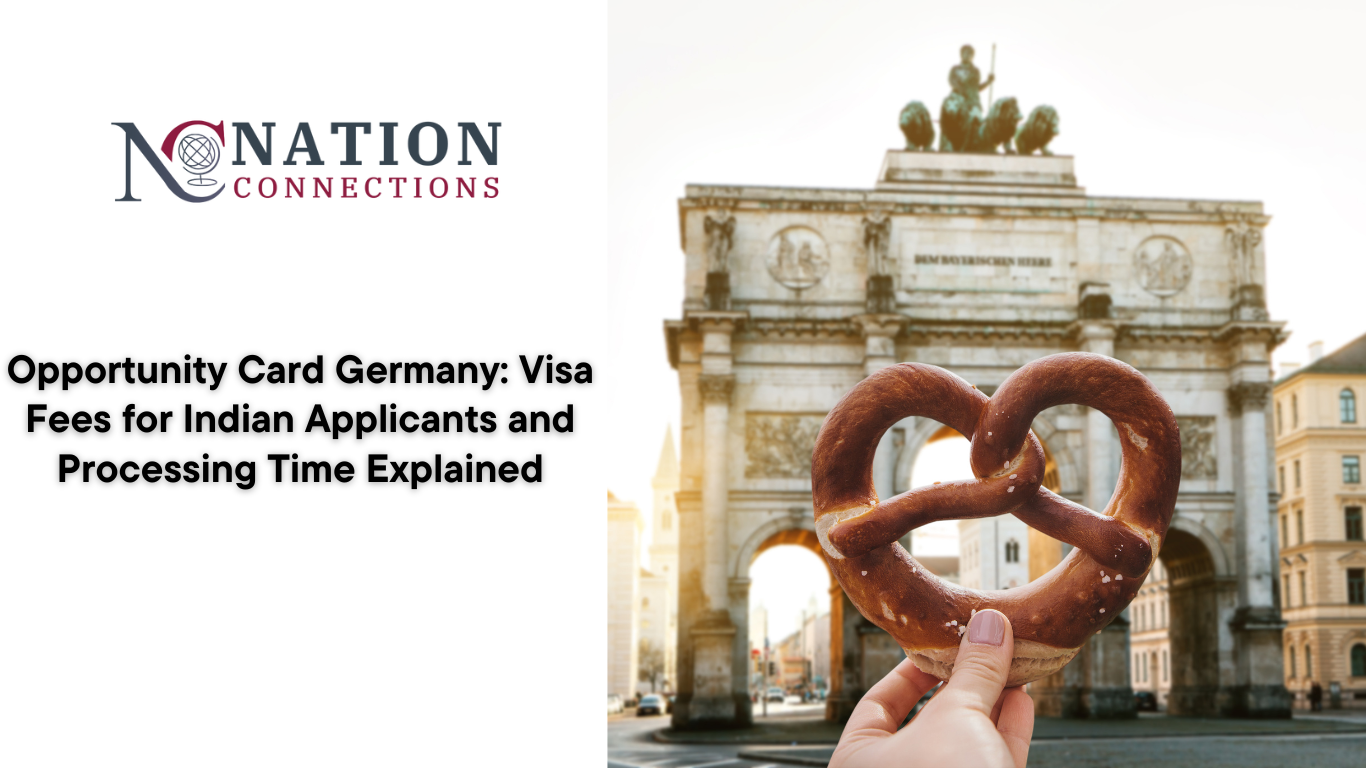
Germany’s Opportunity Card is a visa pathway designed under the revised Skilled Immigration Act. It allows eligible non-EU nationals to enter Germany, look for work, and possibly get their qualifications recognised. For Indian applicants, this opens up a significant opportunity — but there are costs, timeframes, and procedural nuances you should know well.
It’s a type of national visa / residence permit (Sections 20a and 20b of the German Residence Act) that lets foreign nationals live in Germany for up to 12 months while searching for a qualified job.
Once you get a job that meets certain criteria, you can transition to a work/residence permit.
Some of the eligibility criteria which affect how quickly things proceed or whether extra fees may apply:
Recognised foreign qualifications (or proof of equivalence).
Language skills (German A1 or English B2) and professional experience.
Minimum points under the points system (age, qualifications, experience, etc.).
If any documents require recognition / equivalence, that step may add to the processing time.
Here are the known fees and potential additional costs, specifically for or relevant to Indians applying for the Opportunity Card:
| Fee Component | Amount / Range | Notes |
|---|---|---|
| Standard Application Fee | €75 | This is the base fee for Opportunity Card applications. |
| Currency Conversion / Local Payment | Equivalent in Indian Rupees, depends on current exchange rate. In many user-reports, values seen around ₹7,000 – ₹8,000, sometimes more depending on consulate or added “service charges”. | |
| Translations / Notarisation | Varies; could be €50-€150 (or more) depending on number of documents and whether certified/official translations needed. | |
| Document Recognition / Equivalence (ZAB or other body) | Possible extra cost | If your degree or professional qualification needs assessment / recognition, this may cost additional time and fees. |
| Miscellaneous | e.g. appointment booking fees (through VFS / consular service providers), biometric/photo fees, health insurance for the proposed stay etc. These vary. |
Important: The base fee is non-refundable even if the application is rejected.
Processing times vary a lot depending on which city/consulate you apply from, how complete your documentation is, and how busy the system is. Here are the details plus real-life experiences:
| Stage | Typical Duration | Key Factors / Real-Life Variance |
|---|---|---|
| Appointment Wait / Slot Booking | Several weeks to a few months | Some consulates, like Chennai or Mumbai, have long waiting-lists. Applicants report appointment slots taking up to 2-3 months. |
| Document Preparation & Verification | 2-4 weeks or more | Time for translation, qualification recognition, gathering all required documents. Delays often here. |
| Consulate / Embassy Processing After All Documents & Interview Submitted | 4-6 months is often mentioned; sometimes faster if everything is in order. | |
| Possible Fast Cases | Some applicants had approvals in ~4-8 weeks if they had very clean documentation, fast appointment, recognized degrees etc. |
Overall, most Indian applicants report that the full process from application submission to visa issuance takes ~3 to 6 months.
To help you plan, here are the typical bottlenecks or issues that slow the process down:
Incomplete documentation: missing translations, missing proofs (education, work experience, funds).
Recognition of qualification: If your degree needs to be evaluated by ZAB (Germany’s authority for recognition), that can take several weeks.
Appointment availability for VFS / consular services.
Consulate workload / backlog; seasonal peak times (more applications) slow replies.
Requests for additional documents or clarifications, especially for verifying authenticity.
Your place of application: different consulates have different demand and capacity.
| Scenario | Steps | Time Estimate |
|---|---|---|
| Good Case (All docs ready, recognized degree, prompt appointment, consulate less busy) | 1. Gather all documents → 2. Book appointment quickly → 3. Submit application → 4. Interview/biometrics → 5. Processing, visa issuance | ~ 8-10 weeks (~2-2.5 months) |
| Average Case | Includes wait time for appointment, some back and forth on documents, recognition delays | ~ 3-6 months |
Start early: gather all required documentation well in advance (transcripts, degree certificates, translations).
Check recognition early: if your qualification is likely to need recognition (via ZAB or equivalent), initiate that pre-application.
Learn the language piece: even basic German (A1) helps; also ensure your English level is documented if required.
Monitor appointment portals closely: slots may open temporarily; set alerts.
Ensure financial proof & health insurance: having these ready helps avoid delays.
Keep current information: policies, fees, and processing times may change; check official sources (German consulates in India, “Make it in Germany” portal, VFS) close to your application date.
Putting together all costs (visa fee + translations + document recognition + appointment/biometrics etc.), Indian applicants should budget €75 base fee (~₹7,000-₹10,000 depending on exchange and consulate) plus extras. Realistic total cost could be €150–€300+ or more depending on individual case.
Official German sources estimate “several weeks” to some months for Opportunity Card processing.
But Indian applicants (through VFS / consulates) often report longer timelines, especially at the appointment waiting stage. The span from first applying (or joining waiting list) to actual visa issuance is frequently 3‐6 months, sometimes more.
The Germany Opportunity Card is a great pathway for Indians with qualified education / experience to live and seek work in Germany. However:
Be prepared for €75 as the base visa fee, plus additional costs depending on your documents and procedures.
Plan realistically for 3-6 months processing time in many cases, though under ideal conditions it can be faster (~2-3 months).
Much of the variation depends on your documentation, appointment wait times, and qualification recognition.



